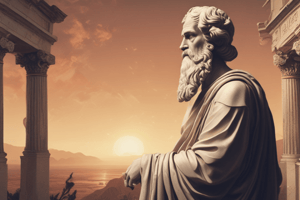Podcast
Questions and Answers
What does the term 'aisthetikos' refer to in the context of art?
What does the term 'aisthetikos' refer to in the context of art?
- A type of artistic value
- One who perceives through sensations and feelings (correct)
- A philosophical concept of truth
- An opinion about aesthetic experiences
According to Plato, how is knowledge distinguished from opinion?
According to Plato, how is knowledge distinguished from opinion?
- Knowledge is subjective while opinion is objective
- Knowledge is certain; opinion is uncertain (correct)
- Knowledge is derived from sensory experiences
- Knowledge reflects societal beliefs, opinion reflects personal beliefs
What is the purpose of the four kinds of causes in philosophy?
What is the purpose of the four kinds of causes in philosophy?
- To critique philosophical arguments
- To categorize varying artistic expressions
- To explain and understand phenomena (correct)
- To explore sensory perceptions in art
What does the final cause refer to in philosophical terms?
What does the final cause refer to in philosophical terms?
How does Plato initiate his dialogues?
How does Plato initiate his dialogues?
What is a syllogism in philosophical terms?
What is a syllogism in philosophical terms?
What is the role of cross-examination in Plato's dialogues?
What is the role of cross-examination in Plato's dialogues?
What aspect of philosophy is highlighted by its contribution to disciplines?
What aspect of philosophy is highlighted by its contribution to disciplines?
What is the main purpose of psychological warfare?
What is the main purpose of psychological warfare?
How does the 'Poisoning the Well' fallacy operate?
How does the 'Poisoning the Well' fallacy operate?
Which of the following is an example of linguistic manipulation?
Which of the following is an example of linguistic manipulation?
What does the term 'Ad Nauseam' refer to in the context of argumentation?
What does the term 'Ad Nauseam' refer to in the context of argumentation?
What is the definition of a fallacy?
What is the definition of a fallacy?
Which statement best describes 'Rationalizing'?
Which statement best describes 'Rationalizing'?
What does the saying 'what is true to you may not be true for me' imply in psychological contexts?
What does the saying 'what is true to you may not be true for me' imply in psychological contexts?
Why might advertisements use catchy jingles?
Why might advertisements use catchy jingles?
What is the primary goal of using professional manipulations?
What is the primary goal of using professional manipulations?
What is an implication of repeated assertions in argumentation?
What is an implication of repeated assertions in argumentation?
What does the Straw-Man Fallacy involve?
What does the Straw-Man Fallacy involve?
The Fallacy of Composition incorrectly applies attributes from individuals to a whole group. What is an example of this fallacy?
The Fallacy of Composition incorrectly applies attributes from individuals to a whole group. What is an example of this fallacy?
What is a characteristic of the Slippery Slope Fallacy?
What is a characteristic of the Slippery Slope Fallacy?
In what way does the Straw-Man Fallacy misrepresent arguments?
In what way does the Straw-Man Fallacy misrepresent arguments?
Which of the following is NOT a characteristic of the logical fallacies discussed?
Which of the following is NOT a characteristic of the logical fallacies discussed?
Which philosopher argued that the body and soul are one being made up of matter and form?
Which philosopher argued that the body and soul are one being made up of matter and form?
What does Karl Jaspers refer to as boundary situations for human beings?
What does Karl Jaspers refer to as boundary situations for human beings?
According to Plato's theory, what exists prior to the body and after it is gone?
According to Plato's theory, what exists prior to the body and after it is gone?
What is John Locke's theory of the self best known as?
What is John Locke's theory of the self best known as?
What problem in philosophy relates to human consciousness and its interaction with the body?
What problem in philosophy relates to human consciousness and its interaction with the body?
Which philosopher held the dualistic view that the body and soul are separate entities?
Which philosopher held the dualistic view that the body and soul are separate entities?
What do boundary situations lead to, according to Karl Jaspers?
What do boundary situations lead to, according to Karl Jaspers?
What notion did John Locke emphasize regarding consciousness?
What notion did John Locke emphasize regarding consciousness?
How does Saint Thomas Aquinas view the relationship between body and soul?
How does Saint Thomas Aquinas view the relationship between body and soul?
Which concept denotes the idea that the material realm is different from the realm of ideas?
Which concept denotes the idea that the material realm is different from the realm of ideas?
What does St. Augustine suggest about human beings?
What does St. Augustine suggest about human beings?
According to Emmanuel Levinas, a human being's actions should primarily be for whom?
According to Emmanuel Levinas, a human being's actions should primarily be for whom?
What is a key aspect of the sacredness of the environment?
What is a key aspect of the sacredness of the environment?
What role does imagination and reflection play according to the content?
What role does imagination and reflection play according to the content?
How does the content characterize God in relation to creation?
How does the content characterize God in relation to creation?
What does the act of caring and respecting in virtue ethics signify?
What does the act of caring and respecting in virtue ethics signify?
What aspect is highlighted regarding the continuous creation of the environment?
What aspect is highlighted regarding the continuous creation of the environment?
What encompasses the relationship between human beings and the environment based on the content?
What encompasses the relationship between human beings and the environment based on the content?
Flashcards are hidden until you start studying
Study Notes
Key Philosophical Concepts
- "Aisthetikos" refers to an individual perceiving things through sensations, feelings, and intuitions.
- Plato distinguished knowledge from opinion, asserting that knowledge is certain and reflects reality, while opinion is unreliable and deceptive.
- Plato's dialogues often start with widely accepted opinions and utilize questioning to uncover deeper truths.
Causes in Philosophy
- Material Cause: Refers to the composition or material makeup of an object.
- Formal Cause: Involves the design or form of an object.
- Final Cause: Represents the purpose or goal of an object.
- Efficient Cause: Pertains to what initiates a change in an object.
Importance of Philosophy
- Philosophy offers a holistic view of life, answering fundamental questions about existence and morality.
- It aids in the development of various academic disciplines and fields of knowledge.
- Psychological warfare manipulates beliefs and perceptions, with the adage "what is true for you may not be true for me" highlighting relativism's dangers.
Argumentation and Fallacies
- An argument combines propositions to persuade others of a conclusion's truth.
- Common fallacies include:
- Poisoning the Well: Discrediting opposing evidence upfront to prevent discussion.
- Straw-Man Fallacy: Attacking a misrepresented version of an argument rather than the argument itself.
- Slippery Slope Fallacy: Assuming that one action will lead to an inevitable series of negative outcomes without justification.
Human Existence and Consciousness
- Karl Jaspers posited that human beings confront existential limitations, prompting deeper self-reflection.
- Unity of Body and Soul: Saint Thomas Aquinas argued that the body and soul are interconnected, with the soul (form) unable to exist without the body (matter).
Dualism
- Dualism suggests a distinct separation between body and soul, as argued by Plato, who believed the soul exists before and after the body.
- John Locke described the self as "tabula rasa," emphasizing consciousness as critical for personal identity, with thoughts always being conscious.
Ethics and the Environment
- Virtue Ethics emphasizes the importance of care and respect for others, extending to the environment and non-human entities.
- The sacredness of the environment reflects the belief in its creation by a divine source, promoting an ethical responsibility toward all creation.
Studying That Suits You
Use AI to generate personalized quizzes and flashcards to suit your learning preferences.




